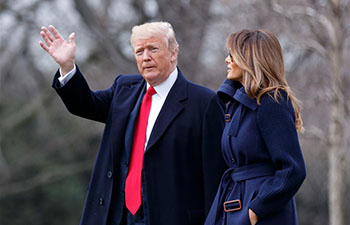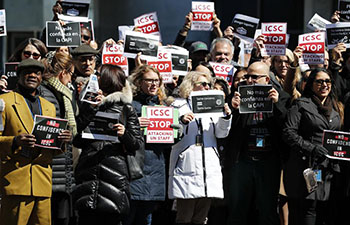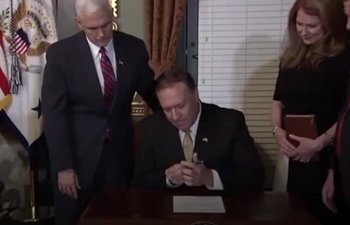by Xinhua writer Yang Shilong
NEW YORK, March 22 (Xinhua) -- Had Levi Strauss & Co., a famous jeanswear manufacturer, not expanded its business into emerging markets including China, Russia and India around 2011, it would have still been enduring a rough time at home in the heavily competitive retail market of casual pants.
"For more than 140 years, consumers around the world have looked to Levi's as one of the most inclusive American brands and this is only made possible by a free and fair trade system," said a spokesperson of Levi Strauss & Co. in an interview with Xinhua on Wednesday.
That is why it joined 25 major U.S. retail companies including Walmart, Costco and Best Buy on Monday, urging U.S. President Donald Trump not to impose sweeping tariffs on Chinese imports.
"We support open markets and free trade where everyone plays by the rules. Unilateral tariff impositions risk retaliation and destabilizing the global economy, in which case American brands, workers and consumers will ultimately suffer," the spokesperson added.
Dozens of U.S. business groups have expressed concerns at reports that Trump would enact new tariffs on 60 billion dollars of annual Chinese imports on Thursday.
Such tariffs would raise prices on consumer goods, kill jobs and drive down financial markets, warned 45 American trade associations representing retail, technology, agriculture and other consumer-product industries in a letter to the White House on Sunday.
SHORT-SIGHTED POLICY
The Trump administration has repeatedly attributed the country's economic slowdown and job losses to trade deficits with major trading partners and vowed to change the situation by imposing tariffs and other non-tariff trade barriers if necessary.
"That will not solve America's economic problems and probably in the long term will make it worse," Robert Lawrence Kuhn, a leading China expert, told Xinhua. "And the reason is because there are these natural economic principles that you're violating by heavy tariffs."
"It helps a few Americans for a short term, a decade or more," Kuhn said, "But over the long term, it hurts America because it prevents the transformation of industry into industries that are more sustainable ...It's like going backwards to try to protect something that is not protectable in the long term."
Such tariffs are politically expedient because Trump "sort of promised that" to his supporters in the manufacturing-dependent mid-west U.S. states, which have seen great job losses in the past decade, Kuhn noted.
The loss of U.S. manufacturing jobs, as pointed out by Edward Alden, a senior fellow at the think-tank Council on Foreign Relations, in his new book "Failure to Adjust," was more about automation that increases productivity of the remaining factories in the country, which meant fewer workers working in factories.
"The problems will not be solved by bashing China," Kuhn said, "They will be solved by reeducation (of workers) over the long term, so that these people can have different kinds of, new kinds of jobs."
Trump could be "doing far more to aid manufacturers" in the mid-west through measures such as infrastructure investment and workforce-development, said Annie Lowrey, a contributing editor at The Atlantic, in an article titled The Limits of 'Made in America' Economics.
"But for now, Trump's biggest trade move would likely come at the expense of a region he has made great promises to. In trying to punish China to help the heartland, Trump seems likely to hurt it," Lowrey said of Trump's tariffs on steel and aluminum imports.
NO WINNER IN TRADE WAR
Many experts expressed their concerns that Trump's unilateral move would invite China's retaliation that would further hurt the U.S. economy.
Chinese Foreign Ministry spokesperson Hua Chunying said on Wednesday that no one will emerge a winner from a trade war.
If the United States makes moves that harm Chinese interests, China will undoubtedly take necessary measures to safeguard its legitimate rights and interests, she said.
"The potential backlash from China could be painful," wrote John W. Schoen, an economics reporter, on Wednesday.
U.S. exports of goods and services to China supported more than 900,000 jobs in 2015, the latest data available from the U.S. Department of Commerce, he said, adding some 600,000 of those jobs were supported by goods exports and 310,000 by services exports.
Among the biggest losers would be American farmers, who in 2016 sold 21 billion dollars worth of farm products to China, the second-largest market for U.S. agricultural products, according to Schoen.
Other industries that would be prime targets for higher Chinese tariffs include aircraft (with 15 billion dollars in 2016 exports), electrical machinery (12 billion dollars), machinery (11 billion dollars) and vehicles (11 billion dollars), he said.
In general, trade disputes among World Trade Organization (WTO) members should be resolved through the WTO mechanism, not based on a member's domestic law, said Zhiqun Zhu, a professor of political science and international relations at Bucknell University in the U.S. state of Pennsylvania.
"The use of Section 301 to punish China will make people think that the United States puts its domestic rules above international law, which will further tarnish the country's international image," Zhu said.
"If the United States slaps unilateral sanctions, China will certainly make a tit-for-tat retaliation. In the end, consumers and businesses in both countries will suffer," he said.
"It's a lose-lose option," Zhu added. "In an age of globalization and interdependence, it is hard to believe that some people still think economic sanctions will solve trade problems."
(Xinhua reporter Zhang Mengxi in New York also contributed to the story)













